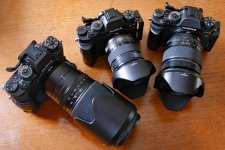I am getting to the stage of life where I’m finding it increasingly difficult to wrangle a Nikon D810 and it’s lenses. Last week I fractured my left thumb and fear that in the longer term I may have lost more strength to handle a hefty chunk of kit.
Has anyone else faced the same problem and what did you opt to do? I don’t want to sacrifice IQ in moving to mirrorless which seems like the obvious move.
Has anyone else faced the same problem and what did you opt to do? I don’t want to sacrifice IQ in moving to mirrorless which seems like the obvious move.


